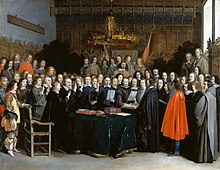
Back دولة قومية Arabic Estáu nación AST Milli dövlət Azerbaijani میلی دؤولت AZB Нацыянальная дзяржава Byelorussian Нацыянальная дзяржава BE-X-OLD Национална държава Bulgarian জাতিরাষ্ট্র Bengali/Bangla Estat nació Catalan دەوڵەتی نەتەوەیی CKB

| Part of the Politics series |
| Basic forms of government |
|---|
| List of countries by system of government |
|
|
| Part of a series on |
| Nationalism |
|---|
| Part of the Politics series |
| Politics |
|---|
|
|
A nation-state is a political unit where the state, a centralized political organization ruling over a population within a territory, and the nation, a community based on a common identity, are congruent.[1][2][3][4] It is a more precise concept than "country", since a country does not need to have a predominant national or ethnic group.
A nation, sometimes used in the sense of a common ethnicity, may include a diaspora or refugees who live outside the nation-state; some nations of this sense do not have a state where that ethnicity predominates. In a more general sense, a nation-state is simply a large, politically sovereign country or administrative territory. A nation-state may be contrasted with:
- An empire, a political unit made up of several territories and peoples, typically established through conquest and marked by a dominant center and subordinate peripheries.
- A multinational state, where no one ethnic or cultural group dominates (such a state may also be considered a multicultural state depending on the degree of cultural assimilation of various groups).
- A city-state, which is both smaller than a "nation" in the sense of a "large sovereign country" and which may or may not be dominated by all or part of a single "nation" in the sense of a common ethnicity or culture.[5][6][7]
- A confederation, a league of sovereign states, which might or might not include nation-states.
- A federated state, which may or may not be a nation-state, and which is only partially self-governing within a larger federation (for example, the state boundaries of Bosnia and Herzegovina are drawn along ethnic lines, but those of the United States are not).
This article mainly discusses the more specific definition of a nation-state as a typically sovereign country dominated by a particular ethnicity.
- ^ Cederman, Lars-Erik (1997). Emergent Actors in World Politics: How States and Nations Develop and Dissolve. Vol. 39. Princeton University Press. p. 19. doi:10.2307/j.ctv1416488. ISBN 978-0-691-02148-5. JSTOR j.ctv1416488. S2CID 140438685.
When the state and the nation coincide territorially and demographically, the resulting unit is a nation-state.
- ^ Brubaker, Rogers (1992). Citizenship and Nationhood in France and Germany. Harvard University Press. p. 28. ISBN 978-0-674-25299-8 – via Google Books.
A state is a nation-state in this minimal sense insofar as it claims (and is understood) to be a nation's state: the state 'of' and 'for' a particular, distinctive, bounded nation.
- ^ Hechter, Michael (2000). Containing Nationalism. Oxford University Press. ISBN 978-0-19-829742-0 – via Google Books.
- ^ Gellner, Ernest (2008). Nations and Nationalism. Cornell University Press. ISBN 978-0-8014-7500-9 – via Google Books.
- ^ Peter Radan (2002). The break-up of Yugoslavia and international law. Psychology Press. p. 14. ISBN 978-0-415-25352-9. Retrieved 25 November 2010 – via Google Books.
- ^ Alfred Michael Boll (2007). Multiple nationality and international law. Martinus Nijhoff Publishers. p. 67. ISBN 978-90-04-14838-3. Retrieved 25 November 2010 – via Google Books.
- ^ Daniel Judah Elazar (1998). Covenant and civil society: the constitutional matrix of modern democracy. Transaction Publishers. p. 129. ISBN 978-1-56000-311-3. Retrieved 25 November 2010 – via Google Books.